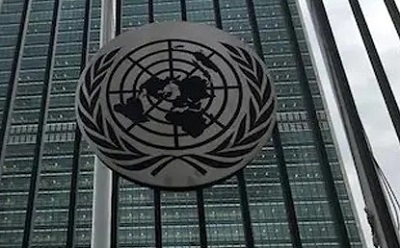United Nations, (Asian independent) After hearing a warning at the polarised Security Council’s emergency meeting from Secretary-General Antonio Guterres that the “Middle East was on the brink”, the only consensus was that there should be no further escalation of tensions there.
“The message around the Council table was very, very clear that there should be no further escalation. Everybody was of the same opinion on this,” Council President Vanessa Frazier told reporters after the meeting on Iran’s thwarted massive attack on Israel.
At the meeting convened hastily at Israel’s request within 24 hours of Saturday’s attack using barrages of missiles and fleets of drones, Israel and Iran traded charges, the US and Britain strongly condemned Iran, and Russia mounted a defence of Tehran.
The Council immobilised by its divisions did not take any action and the meeting was only an occasion for venting.
The opinions, however, coalesced around Guterres’ call “to step back from the brink”.
“It is vital to avoid any action that could lead to major military confrontations on multiple fronts in the Middle East,” he said briefing the Council on Iran’s attack.
“The people of the region are confronting a real danger of a devastating full-scale conflict. Now is the time to defuse and de-escalate. Now is the time for maximum restraint,” he said.
The capture of the Israeli-owned ship, Aries, by Iran, came up during the meeting with several countries calling for the release of the crew, including Indians.
Israel’s Permanent Representative Gilad Erdan asked the Council to not only condemn the attack but also to impose the strongest sanctions on Iran for going ahead with its nuclear programme.
He said that almost all of the missiles and drones were destroyed by Israel and its allies before they could hit their targets, but the failure of the attack should not mean that Tehran is not punished for the attack.
Holding up a video on his tablet, Erdan said it showed Israel neutralising missiles and drones over Jerusalem’s Al-Aqsa Mosque, one of the holiest Muslim shrines and said that Tehran was targeting Islam’s holy places in its quest for Shia domination.
Iran’s Permanent Representative Amir Saed Iravani said that Tehran was using its right to self-defence under the UN Charter to attack Israel after it had struck its diplomatic mission in Syria and killed its personnel.
His country decided to attack Israel only because the Council did not act against it.
US Deputy Representative Robert Wood said his country “is not seeking escalation”, but it “also supports Israel’s exercise of its inherent right to defend itself in the face of this attack”.
He said that a strong condemnation by the Council of Iran and its proxies is the surest way to prevent an escalation of tensions in the Middle East.
Wood countered Iran’s claims of self-defence listing several actions by it across the region and said, “These and other reckless Iranian actions, are not inherently defensive actions”.
Russia’s Permanent Representative Vassily Nebenzia accused the US and its allies of following a double standard when it came to Iran because they would consider an attack on a diplomatic mission a justification for war under international law.
“For you everything that concerns Western missions and Western citizens is sacred and must be protected. But when it comes to other states, their citizens and their rights, including the right to self-defence, then it’s different,” he said.
The West had blocked action on Israel’s attack on the Iranian diplomatic mission in Syria, he said.
“What happened on the night of April 14 did not happen in a vacuum. Iran’s steps were a response to the UN Security Council’s shameful inaction on Israel’s blatant attack on Damascus,” he asserted.
“The situation in the Middle East has become as heated as it may get and the conflict risks escalating to a region-wide confrontation, so we call on all parties who were involved in the incident to exercise restraint,” Nebenzia said.
The Council has scheduled an open debate on the Palestine situation in which all member nations can participate on Thursday with the Israeli onslaught on the Gaza Strip that has seen more than 23,000 people killed crossing the half-year mark.
Israel’s attack was in retaliation for Hamas’s terrorist strike on October 7 in which more than 1,200 people were killed and about 250 were taken hostage.









